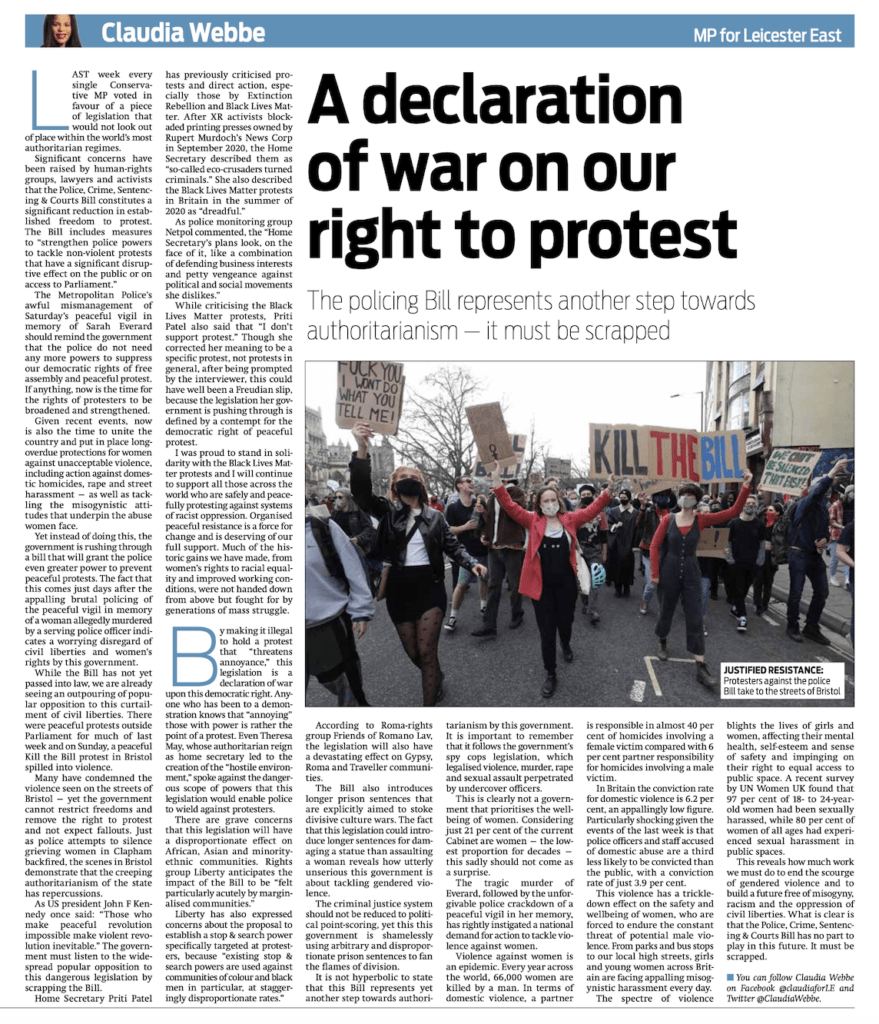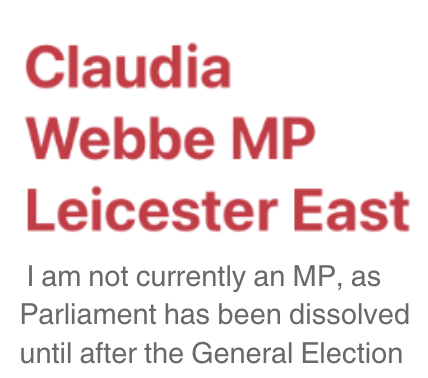
A declaration of war on our right to protest
By Claudia Webbe
The Policing Bill represents another step towards authoritarianism — it must be scrapped, writes CLAUDIA WEBBE
LAST week every single Conservative MP voted in favour of a piece of legislation that would not look out of place within the world’s most authoritarian regimes.
Significant concerns have been raised by human-rights groups, lawyers and activists that the Police, Crime, Sentencing & Courts Bill constitutes a significant reduction in established freedom to protest. The Bill includes measures to “strengthen police powers to tackle non-violent protests that have a significant disruptive effect on the public or on access to Parliament.”
The Metropolitan Police’s awful mismanagement of Saturday’s peaceful vigil in memory of Sarah Everard should remind the government that the police do not need any more powers to suppress our democratic rights of free assembly and peaceful protest. If anything, now is the time for the rights of protesters to be broadened and strengthened.
Given recent events, now is also the time to unite the country and put in place long-overdue protections for women against unacceptable violence, including action against domestic homicides, rape and street harassment — as well as tackling the misogynistic attitudes that underpin the abuse women face.
Yet instead of doing this, the government is rushing through a bill that will grant the police even greater power to prevent peaceful protests. The fact that this comes just days after the appalling brutal policing of the peaceful vigil in memory of a woman allegedly murdered by a serving police officer indicates a worrying disregard of civil liberties and women’s rights by this government.
While the Bill has not yet passed into law, we are already seeing an outpouring of popular opposition to this curtailment of civil liberties. There were peaceful protests outside Parliament for much of last week and on Sunday, a peaceful Kill the Bill protest in Bristol spilled into violence.
Many have condemned the violence seen on the streets of Bristol — yet the government cannot restrict freedoms and remove the right to protest and not expect fallouts. Just as police attempts to silence grieving women in Clapham backfired, the scenes in Bristol demonstrate that the creeping authoritarianism of the state has repercussions.
As US president John F Kennedy once said: “Those who make peaceful revolution impossible make violent revolution inevitable.” The government must listen to the widespread popular opposition to this dangerous legislation by scrapping the Bill.
Home Secretary Priti Patel has previously criticised protests and direct action, especially those by Extinction Rebellion and Black Lives Matter. After XR activists blockaded printing presses owned by Rupert Murdoch’s News Corp in September 2020, the Home Secretary described them as “so-called eco-crusaders turned criminals.” She also described the Black Lives Matter protests in Britain in the summer of 2020 as “dreadful.”
As police monitoring group Netpol commented, the “Home Secretary’s plans look, on the face of it, like a combination of defending business interests and petty vengeance against political and social movements she dislikes.”
While criticising the Black Lives Matter protests, Priti Patel also said that “I don’t support protest.” Though she corrected her meaning to be a specific protest, not protests in general, after being prompted by the interviewer, this could have well been a Freudian slip, because the legislation her government is pushing through is defined by a contempt for the democratic right of peaceful protest.
I was proud to stand in solidarity with the Black Lives Matter protests and I will continue to support all those across the world who are safely and peacefully protesting against systems of racist oppression. Organised peaceful resistance is a force for change and is deserving of our full support. Much of the historic gains we have made, from women’s rights to racial equality and improved working conditions, were not handed down from above but fought for by generations of mass struggle.
By making it illegal to hold a protest that “threatens annoyance,” this legislation is a declaration of war upon this democratic right. Anyone who has been to a demonstration knows that “annoying” those with power is rather the point of a protest. Even Theresa May, whose authoritarian reign as home secretary led to the creation of the “hostile environment,” spoke against the dangerous scope of powers that this legislation would enable police to wield against protesters.
There are grave concerns that this legislation will have a disproportionate effect on African, Asian and minority-ethnic communities. Rights group Liberty anticipates the impact of the Bill to be “felt particularly acutely by marginalised communities.”
Liberty has also expressed concerns about the proposal to establish a stop & search power specifically targeted at protesters, because “existing stop & search powers are used against communities of colour and black men in particular, at staggeringly disproportionate rates.”
According to Roma-rights group Friends of Romano Lav, the legislation will also have a devastating effect on Gypsy, Roma and Traveller communities.
The Bill also introduces longer prison sentences that are explicitly aimed to stoke divisive culture wars. The fact that this legislation could introduce longer sentences for damaging a statue than assaulting a woman reveals how utterly unserious this government is about tackling gendered violence.
The criminal justice system should not be reduced to political point-scoring, yet this this government is shamelessly using arbitrary and disproportionate prison sentences to fan the flames of division.
It is not hyperbolic to state that this Bill represents yet another step towards authoritarianism by this government. It is important to remember that it follows the government’s spy cops legislation, which legalised violence, murder, rape and sexual assault perpetrated by undercover officers.
This is clearly not a government that prioritises the wellbeing of women. Considering just 21 per cent of the current Cabinet are women — the lowest proportion for decades — this sadly should not come as a surprise.
The tragic murder of Everard, followed by the unforgivable police crackdown of a peaceful vigil in her memory, has rightly instigated a national demand for action to tackle violence against women.
Violence against women is an epidemic. Every year across the world, 66,000 women are killed by a man. In terms of domestic violence, a partner is responsible in almost 40 per cent of homicides involving a female victim compared with 6 per cent partner responsibility for homicides involving a male victim.
In Britain the conviction rate for domestic violence is 6.2 per cent, an appallingly low figure. Particularly shocking given the events of the last week is that police officers and staff accused of domestic abuse are a third less likely to be convicted than the public, with a conviction rate of just 3.9 per cent.
This violence has a trickle-down effect on the safety and wellbeing of women, who are forced to endure the constant threat of potential male violence. From parks and bus stops to our local high streets, girls and young women across Britain are facing appalling misogynistic harassment every day.
The spectre of violence blights the lives of girls and women, affecting their mental health, self-esteem and sense of safety and impinging on their right to equal access to public space. A recent survey by UN Women UK found that 97 per cent of 18- to 24-year-old women had been sexually harassed, while 80 per cent of women of all ages had experienced sexual harassment in public spaces.
This reveals how much work we must do to end the scourge of gendered violence and to build a future free of misogyny, racism and the oppression of civil liberties. What is clear is that the Police, Crime, Sentencing & Courts Bill has no part to play in this future. It must be scrapped.
Claudia Webbe MP is the member of Parliament for Leicester East. You can follow her at www.facebook.com/claudiaforLE and twitter.com/ClaudiaWebbe


